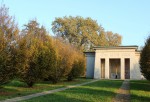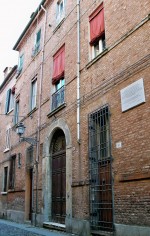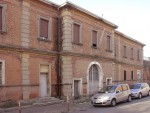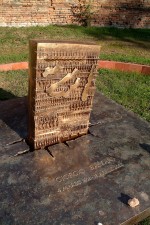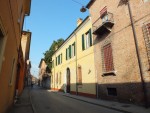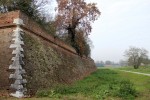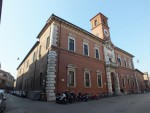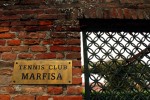Giorgio Bassani (Bologna, 1916 - Rome, 2000)
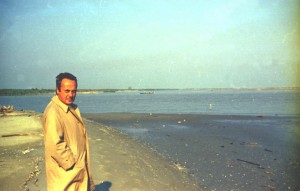
Giorgio Bassani at the Po Delta Park, 1972. Photo from the Paolo Ravenna Archive. © Archivio Paolo Ravenna
Writer and poet Giorgio Bassani helped make Ferrara famous around the world.
Chronology
1916: Bassani is born on 4 March
1928-1934: Bassani attends the Ludovico Ariosto Classics Lyceum
1934: Bassani enrols at the Literature Department of the University of Bologna
1939: Bassani graduates with a dissertation on Niccolò Tommaseo
1943: Bassani is arrested in May, released 26 July
1943: Bassani marries Valeria Sinigallia on 4 August
1948: Bassani becomes editor of Botteghe Oscure
1955: Bassani founds Italia Nostra
1956: Five Stories of Ferrara wins the Strega Prize
1958: The Gold-Rimmed Spectacles is published
1962: The Garden of the Finzi-Continis
1972: The Smell of Hay is published, a collection of short stories
1973: Within the Walls (revision of Five Stories of Ferrara)
1980: final version of The Novel of Ferrara
2000: Bassani passes away on 13 April
2000: On 17 April, Bassani is buried in the Jewish Cemetery in Via delle Vigne
Childhood and adolescence
Giorgio Bassani was born in Bologna on 4 March 1916 to Angelo Enrico Bassani (1885-1948), a doctor who never practised his profession, and Dora Minerbi (1893-1987), who had studied to be a singer. The Bassanis were a well-to-do family from Ferrara. Young Giorgio spent his childhood and adolescence in Ferrara, in the family house in 11 Via Cisterna del Follo, with his parents, his brother Paolo, his sister Jenny and their grandparents. Bassani attended the Ludovico Ariosto Classics Lyceum from 1928 to 1934. One of his teachers, Francesco Viviani was suspended from his job in 1936 for political reasons. Those years at school inspired Bassani to write Behind the Door (1964). At this time, Bassani often played tennis at the Marfisa d’Este Tennis Club in Via Saffi, along with Lanfranco Caretti (1915-1995) and Michelangelo Antonioni (1912-2007).
Racial laws and arrest
In 1934, Bassani enrolled at the Literature Department of the University of Bologna, travelling by train to attend classes. In 1937, he was kicked out of the Ariostea Library because he was Jewish. Perhaps as a result, he was a member of the Action Party from 1937 to 1943, dedicated to anti-fascist activism. In 1938, he often spent time with at the literary café of the Giubbe Rosse (Red Coats) in Florence. In 1939, he graduated university with a dissertation on Niccolò Tommaseo (1802-1874), under the guidance of Carlo Calcaterra (1884-1952), and began teaching at the Ariosto Lyceum. However, due to Italy's racial laws, Bassani was forced to transfer to a job at the Jewish school at 79 Via Vignatagliata. Giorgio Bassani and Pasquale Colagrande (the king's lawyer) can be credited with organising the March 1943 meeting with General Cadorna, the commander of the Ariete Armoured Division stationed in Ferrara, in an attempt to recruit the army to overthrow the nation's fascist rulers. But Cadorna’s military had sworn allegiance to the king, so no progress was made. In 1943, the OVRA (the secret police of the Kingdom of Italy), discovered ‘the existence of a vast, dangerous antifascist organisation to which various people belong...In Ferrara, the main representatives of the movement are Giorgio Bassani, a Jew, originally of liberal ideals, and an elementary teacher with socialist ideas at the Alda Costa School.’ (Pieri-Mascaretti 2008, p. 137)
Arrest, departure from Ferrara and life in Rome
Arrested in May 1943, Bassani was released from the prison on Via Piangipane on 26 July. During his time in prison, Bassani frequently wrote to his family members. The letters were collected in Di là dal Cuore (Beyond the Heart), published in 1984. On 4 August 1943 he married Valeria Sinigallia, who was also Jewish. The couple had two children: Paola Bassani and Enrico Bassani. He decided to leave Ferrara, moving first to Florence and then to Rome, where he would spend the rest of his life. On 15 November 1943, just a few weeks after his departure, Bassani's anti-fascist and Jewish friends were shot and killed by fascists in front of the wall in front of Este Castle. In 1948, Bassani became an editor for Botteghe Oscure, the literary journal founded and published by Princess Marguerite Caetani, giving visibility to promising international authors. Bassani worked in film as a screenwriter, voice-over actor, and actor; he even became friends with Pier Paolo Pasolini (1922-1975). In 1955, Bassani founded Italia Nostra, the association he became president of in 1965. In 1956, he won the Strega Prize for Five Stories of Ferrara, which includes various novellas: Lida Mantovani, The Walk Before Supper, A Plaque on Via Mazzini, The Last Years of Clelia Trotti and A Night in 1943 (the latter was turned into a film by Florestano Vancini in 1960 with the title of Long Night in 1943). That same year, Bassani was hired as an editorial consultant to the Italian publishing company Feltrinelli, eventually becoming Editorial Director, a role he held until 1963. In 1958, he published The Gold-Rimmed Spectacles, which was turned into a film by Giuliano Montaldo in 1987.
The success of The Garden of the Finzi-Continis, revisions of his publications and the last years of his life
Bassani's most successful publication was The Garden of the Finzi-Continis, a novel about the world of aristocratic Jews in Ferrara during the time of Italian racial laws. It earned him the Viareggio Prize in 1962. The Heron, written in 1968, was awarded the Campiello Prize one year later, and in 1970, De Sica’s big-screen version of The Garden of the Finzi-Continis was released, too much criticism from Bassani. The Smell of Hay, a collection of short stories, was published in 1972, and Within the Walls (a revision of Five Stories of Ferrara) came out in 1973. The definitive version of The Novel of Ferrara, which gathers all the novellas and stories about Bassani's beloved city (Within the Walls, Gold-Rimmed Spectacles, The Garden of the Finzi-Continis, Behind the Door, The Heron, The Smell of Hay) was published by Mondadori in 1980. In 1992, the University of Ferrara granted him an honorary degree in natural science; the following year, the Ariostea Library organised a conference in his honour as ‘symbolic compensation’ for banning him in 1938. Bassani passed away on 13 April 2000 in Rome. On 17 April, his body was buried in the Jewish cemetery of Ferrara, honoured with a monument by Pietro Sartogo and Arnaldo Pomodoro.
Legacy
In Ferrara, the Municipal Library in Barco (an old Este hunting lodge to the north of the city) is dedicated to Bassani, as is the City Park. In Codigoro, the Municipal Library is home to the Giorgio Bassani Foundation, where part of the writer’s private library is kept.
Quotes
Quote from an interview with Alberta Levi Temin, with memories of Paolo Ravenna
[Alberta Levi Temin] “...she recounted that after ’38, forced to give up on the idea of enrolling at the university, thanks to her master's degree, she began working as an elementary school teacher at the Jewish school in Via Vignatagliata, which had been adapted to accommodate young Jewish pupils that, had been forced to abandon the classrooms where they had always studied side-by-side with their peers of other religions. ... Alongside Alberta, Matilde Bassani and Giorgio Bassani were also working as teachers there. Giorgio was in charge of the kids at the high school, but there were so few of them (three, in fact, including his sister, Jenny), that class was often held at his house in Via Cisterna del Follo. ... They implemented initiatives in the Jewish school to cheer the kids up. Here the memories are intertwined with those of the lawyer Paolo Ravenna... [who] told us that in 1942, he decided to put on a play by Sergio Tofano, with Bonaventura. But it was a different play than the one at school, because it took place in a setting charged with tension: those on the outside monitored what was being done inside. Matilde and Giorgio Bassani wanted the kids to feel free; Giorgio was a bit of a director, he assigned the parts. During the play, in the small theatre set up in the school's gym, Giorgio made sure that even non-Jews were in attendance, and Attilia Bonfiglioli took the only photographs in existence of the school. Ravenna was one of Giorgio's students. He still remembers the lessons held in the house in Via Cisterna del Follo; he remembers that they would go from literature to painting almost without realising it, thanks to the teacher's way of managing the various arts, as if they were closely united. ... In addition to being colleagues, Alberta Levi and Giorgio Bassani hung out together since they were children... Levi in particular remembered with a smile the time when Bassani, who was three years older than her and already had received his humanities degree, gave her a diction lesson, for a competition that she had been sent to by her master’s degree professor, Claudio Varese... Bassani taught her to recite a poem by Aldo Palazzeschi, The Sick Fountain, explaining to her how to make others really hear the fountain and its clof, clop, clock, cloffete, cloppete, clocchete, Each splash, each droplet, very slowly.’ (Castaldi - Palma, 2005, pp. 46-48)
“Miei cari, scusate se vi scrivo solo due righe, in fretta: ma ho scritto ora a Valeria, e il tempo m’è trascorso, e adesso bisogna consegnare la posta. Sto bene, sono calmo e tranquillo. Il cibo che mi mandate m’ha restituito energia e benessere. E grazie anche alla Jenny, perché sarà lei, immagino, che mi porta la roba tutte le mattine. Vi dirò poi che le seppie di ieri erano miracolose. Ma chi diavolo ha insegnato alla fucina famigliare un manicaretto così squisito? Certo è che m’han fatto venire in mente il mare, il sole del mare, il salso del mare. E non erano, per il povero galeotto, le nostalgie più facilmente superabili che lo potessero assalire. Mandatemi un altro pezzo di sapone, mi raccomando. Fino ad ora son riuscito a mantenermi passabilmente pulito. Ma le pulci, ahimè! Le sento passeggiare tra i peli delle gambe, e non c’è pericolo che mi succeda di catturarne nessuna. Però mordono con riguardo e dolcezza, da gente del mestiere. E si fan sopportare”. (Lettere dal carcere, maggio-luglio 1943, in Bassani. Racconti, diari, cronache. 1935-1956, p. 264)
“Cara mamma, ho ricevuto le tue lettere, che m’hanno fatto molto piacere. Sento anche da Valeria che ti stai rimettendo in forze, e questo è il più bel regalo che tu mi possa fare. Grazie per le squisite pietanze che mi mandi. Tutto è perfetto e la tua mano maestra si sente dovunque. In questi giorni ho riletto Guerra e Pace, e chissà perché pensavo spesso a te, voltando pagina. Certo, qualcosa di te circola nelle scene famigliari di quel gran libro. Eppoi il modo che ha Tolstoj di mettere in ridicolo quel suo tetro Napoleone è un po’ il tuo, popolare ed entusiasta, quello che dà tanto sui nervi al papà, che mira invece all’obiettività storica. Insomma sei una gran donna, e hai un monte di qualità. E non è un po’ colpa tua se mi sono deciso a voler bene a Valeria? Parla qualche volta di me alla Lulù, citandomi insieme col ‘tupìn’ per darle emozioni più profonde. Ieri sera, pensando alla Lulù, ridevo forte, da solo, come un mentecatto. Quanta innocenza e bontà in lei e in Totò. Salutami anche Totò, se lo vedi…”. (Lettere dal carcere, maggio-luglio 1943, in Bassani. Racconti, diari, cronache. 1935-1956, p. 269)
Bibliography
- Castaldi, Rita - Molinari, Antonietta (a cura di) «Giorgio Bassani: gli anni della formazione e l’esordio poetico (1943-1945). Quaderni del Liceo Classico L. Ariosto», 51, 2005, Ferrara
- Pieri, Piero - Mascaretti, Valentina (a cura di), Cinque storie ferraresi. Omaggio a Bassani, ETS, Pisa 2008
- Pavani, Monica, L’eco di Micòl. Itinerario bassaniano, 2G, Ferrara 2011
- Pieri, Piero (a cura di), Bassani. Racconti, diari, cronache. 1935-1956, Feltrinelli, Milano 2014
Sitography
Related places
Related Itineraries
Compiling entity
- Istituto di Storia Contemporanea di Ferrara
Author
- Edoardo Moretti
- Sharon Reichel

